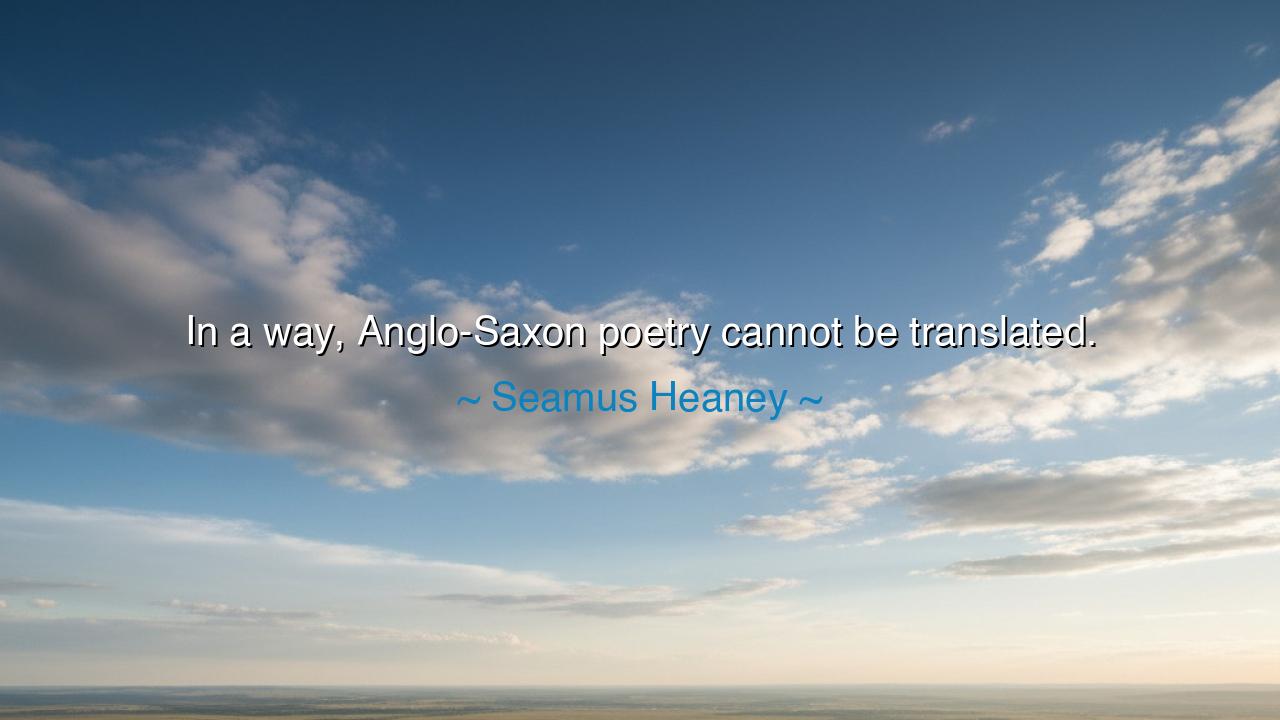
In a way, Anglo-Saxon poetry cannot be translated.






“In a way, Anglo-Saxon poetry cannot be translated.” Thus spoke Seamus Heaney, poet of Ireland and translator of Beowulf, who wrestled with the tongues of the ancestors until he brought them, glowing, into the light of the modern ear. His words are not a denial of translation but a recognition of mystery: that some music, some rhythm, some spiritual weight lives so deeply in the marrow of a language that no other tongue can bear it unchanged.
The meaning of this saying lies in the ancient power of words themselves. The poems of the Anglo-Saxons were born of a harsh land and a warrior’s world, filled with the crash of swords, the sorrow of exile, the fleeting joy of feasts in fire-lit halls. Their alliteration, their stark kennings, their cadence of stress and pause were not ornaments but the very bones of the verse. To render them into another tongue is to catch their shadow, but never the full substance. For poetry is not only what it says, but how it sounds, and sound cannot be carried whole across the borders of language.
The origin of Heaney’s insight comes from his lifelong labor with Beowulf. He loved the poem’s stark grandeur, its mixture of pagan heroism and Christian sorrow, but he knew too well the impossibility of making modern English hold the exact weight of its Anglo-Saxon parent. To translate was to reimagine, to echo rather than to replicate. His own version, widely praised, was not a mirror but a flame carried from one fire to another. He knew that in translation something is always lost, yet also that something may be gained: a new life for an ancient song.
History offers other examples. When Homer’s epics were translated from Greek into Latin, then into English and other tongues, their rhythm of dactylic hexameter could not survive intact. Translators chose blank verse, heroic couplets, or prose, each capturing one aspect but never the whole. Yet even in imperfection, the power endured. Similarly, when the Hebrew psalms were carried into Greek, then Latin, then English, their music changed, but their spirit lived on. Heaney’s words remind us of the paradox: poetry cannot be fully translated, and yet it must be, or it risks silence.
The lesson here is both humbling and empowering. We must approach the poetry of other ages and tongues with reverence, knowing that what we read is not the original song but its reflection. Yet even a reflection can inspire. The task of the translator is not to create an identical twin, but to build a bridge, so that voices long silent may speak again. Heaney himself built such bridges, and though he confessed the impossibility of perfection, he gave the world a gift that stirred countless hearts.
Practically, this means that when we encounter translated poetry, we should read with both gratitude and humility. Gratitude, that someone labored to carry the song across the centuries; humility, that we will never grasp it fully as the original hearers did. And if we are called to the work of writing, let us also be translators—not only of words, but of experiences, carrying across time and space the truths that might otherwise be lost.
Thus the teaching endures: Anglo-Saxon poetry cannot be fully translated, yet it continues to live because poets like Heaney dared to bring it forward. We, too, must learn this paradox: that some things cannot be perfectly carried over, but they can still be shared, still be sung anew. For the heart of poetry is not only in its untranslatable form, but in its power to awaken the human soul across ages, tongues, and worlds.






GTMinh Giao Trieu
Heaney's comment raises an interesting point about the essence of poetry in its original form. Is translation an attempt to bring other cultures closer to the original work, or does it inevitably strip away parts of its soul? I’m curious whether Heaney's view on Anglo-Saxon poetry applies only to that genre or if it’s a broader comment on the challenges of translating poetry across different languages and eras.
DAHOANG DIEU ANH
Heaney's observation about the untranslatability of Anglo-Saxon poetry makes me wonder about the limits of translation itself. If a language carries so much history and emotion within its words, can any translation ever do it justice? I think about how often we struggle to translate the emotional weight of words or phrases even in more modern languages, so how much more complicated must it be with ancient languages like Old English?
UGUser Google
I find it intriguing that Heaney claims Anglo-Saxon poetry cannot be translated. Is it because the nuances of the language, with its unique sounds and structures, are lost when rendered in modern languages? Or is it the cultural significance and worldview embedded in the poetry that is too difficult to convey fully? I wonder if Heaney is highlighting the irreplaceable quality of the original poems, where the language itself becomes part of the experience.
HGHuong Giang
Heaney’s statement about Anglo-Saxon poetry not being translatable really makes me think about how much of a language’s essence is tied to its cultural context. Can we ever truly capture the feeling and texture of the original through translation? Perhaps the rhythm, sounds, and even the historical context of Anglo-Saxon poetry are so deeply rooted in the language that they lose something vital when translated. How can we preserve the integrity of such works?